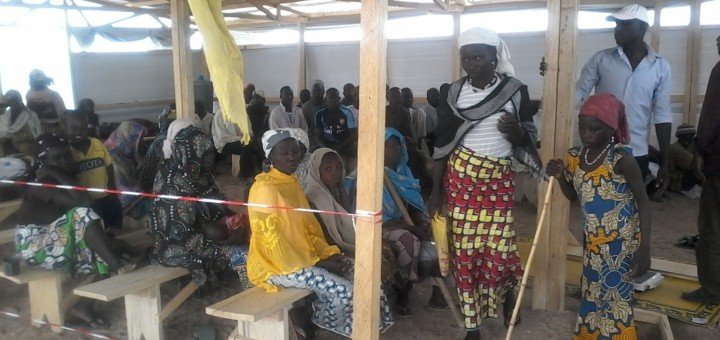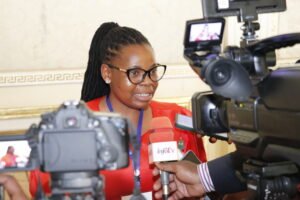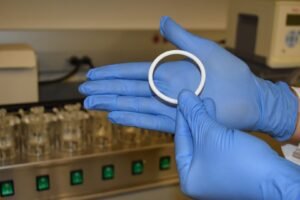 The Minawao refugees’ camp situated in the far north region of Cameroon is presently hosting some 46.639 Nigerians enrolled in the database of the United nations high commission for refugees. With regard to the troubles caused by the sect Boko haram on the borders between Cameroon and Nigeria many had fled living behind their families and daily activities. As a matter of fact, the site of Minawao has been a site targeted for this report based on the application of standards and norms surrounding sexual reproductive health and rights (SRH).
The Minawao refugees’ camp situated in the far north region of Cameroon is presently hosting some 46.639 Nigerians enrolled in the database of the United nations high commission for refugees. With regard to the troubles caused by the sect Boko haram on the borders between Cameroon and Nigeria many had fled living behind their families and daily activities. As a matter of fact, the site of Minawao has been a site targeted for this report based on the application of standards and norms surrounding sexual reproductive health and rights (SRH).
The field work conducted under the banner of the IPPF African regional bureau together with its member association known as the Cameroon National Association for Family Welfare permitted to see how could be intensified sexual reproductive health and rights activities in the camp presently having two health points conducted by the international Medical corps (IMC) and Médécins Sans Frontiers (MSF).
Health conditions of refugees
The striking issue for a new person entering the camp for his or her first time is the great affluence of people in the various health points coming for consultations and assistance. The refugees have been greatly sensitized on the need to go to the various health centers put in place for them free of charge by a joint convention of the Cameroonian government and different international health organizations such as the United Nations high commission for refugees (UNHCR), World health organization (WHO), the United Nations children’s emergency Fund (UNICEF) and the United Nations populations’ fund (UNFPA) whose material support is really felt at the level of the camp. There is immediate care of refugees coming with some psychological disorders; over 48 consultations have so far been realized by the lone psychologist in the camp as a result of depression for many who lose their wealth and families during the Boko Haram raids.
Over 1330 consultations have been carried by IMC and 702 by MSF with among others 326 children less than 5years old mostly affected by respiratory diseases and malaria, one of the cause of morbidity in the camp. At the moment when this field report was undertaken, we were informed of two death cases in the sanitary centers that are a less than 5 years old child due to malaria and an adult of diabetes. Pathologies due to lack of hygienic conditions are present in the camp calling for more response in the domain of the Water, sanitary and health (WASH) programme that has to intensify its water supply and construct several latrines. Epilepsy cases have also been observed as one of the major outcomes of consultations carried by IMC with regard to the 58% represented in the past weeks.
Sexual reproductive health and rights
The focus point of this assignment been the assessment of standards SRH in Minawao site has been conducted at the level of the IMC medical center and all around the camp in order to see how the refugees live in families and how do they go for their sexual intimacies.
In the first place, the team of IMC based at the maternity composed of four midwives has carried out recently close to a hundred prenatal consultations and per week close to 15 birth deliveries though sensitizations have been multiplied over the current weeks to address the issue of birth deliveries at home. Many women attend educative talk sessions done in French language but translations are made by other refugees who volunteered themselves as translators. The UNFPA has put in place some strategies that enhance such activities; two types of kits dubbed as kits of dignity and birth delivery. They have been composed to promote consultations, counseling and delivery at the maternity and discourage other mal practices observed earlier.
The kit of dignity is an element of necessities that a woman needs in the first place when she is welcomed at the camp and thereafter and kits of birth delivery is a set of elements granted to a woman who has just given birth. They are composed of a bucket, towels, under wears, slippers etc. The distribution of goods and other basic necessities are coordinated by other organisms based in the site weekly and monthly contrary to reports made by some journalists, the ladies at the camp are guaranteed by a minimum care when on their gestation periods though due to some cultural barriers and developed habits of a group some do not refer to the medical center for care.
John Fiayama, is a nigerian refugee, he had five kids but two of them died. For him and wife family planning was not important until the start of the Boko Haram raid. He has opted for injections for his wife since their arrival at the camp meanwhile, Charles Yohanna, young Nigerian refugee student says contraception is not really necessary for him and wife, and there is mutual understanding that does not necessitate the use of any modern method. Young aged Fatima, with whom we had a chat, is a mother of two kids already; she has never heard of contraceptives and her first born is about two years old while the baby is just six months. Her husband intends to have a large family and yet does not know how to do without. Another woman aged 37 encountered at the camp who tried to express herself revealed to us that she had six kids presently and has opted for injections without the consent of her husband. This is the case for many women who go in for weekly educative and counseling sessions at the level of the maternity, most of the men are not for the family planning idea. They think it is a way of discouraging their wives to have sex with them freely as from reports many have forbidden their wives to take part at such animation programmes. The utilization of modern contraceptives methods such as female and male condoms is low while injections’ rate turns to increase due to its discrete nature and the repeated sensitizations carried so far. There is a high rate of children in the camp; families with five to fifteen kids are seen and are those that intend to grow up in size again, a situation that calls for family planning actions. The refugees as observed are grouped into families in separate tents, only on arrival that they are joined together before been attributed individual tents by the team of site planner. That is why many find it difficult the first weeks to have their sexual intimacy just as big families grouped together with kids. The appropriate time for them to express is when the children are in school or are out for games, leisure or in search of fire wood. Charles Yohanna says he lives only with his wife and finds no problem in sexual intimacy while others like Oumate, father of seven says he has opted for a given period with his wife to undertake sexual intercourses, preferably in the night when the children are deep at sleep.
Though the refugee camp of Minawao has largely grown over the past months, weeks and days with commercial activities already gaining roots, there is a great need to affect a gynaecologist who will work with the current team of mid wives, in case of complications that may occur during birth delivery before immediate transportation to the Mokolo district hospital where difficult cases are been referred to. Educative talks though underway should be reinforced by counseling sessions, about three times a week this to document the population of the site especially the men who are hindrances to the use of modern contraceptive methods and family planning issues. The issue of gender based violence carried out by relay teams of UNWOMEN and local based associations for this fight needs to be intensified following reports on eight cases registered by the UNHCR upon the past weeks and the rate of complaints estimated to thirty two per week. It is worth mentioning the fact that more material and financial support been attributed to permit the refugees easily get asses to medical care; as for instance the displacement of a patient from his tent to the medical point should be facilitated by tricycles of transportation with regard to the largeness of the camp.
By Elise Kenimbeni





